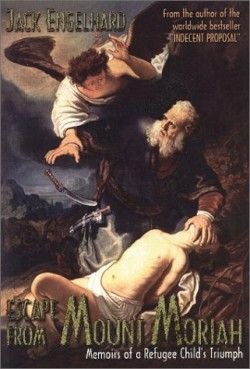Escape from Mount Moriah
Childhood Innocence Sacrificed in the Aftermath of the Holocaust
Engelhard, author of the best-seller Indecent Proposal, writes an anecdotal memoir relating the physical and emotional dislocation of his childhood due to the Holocaust and his family’s escape from Nazi-occupied France. Rather than elaborate on the tribulations over the course of that escape, however, the author focuses on his family’s inability to remain safely in one place and his father’s incapacity to succeed in the new country.
The book consists of eighteen short anecdotes on what it meant for the author and his family to be poor, to be Jewish, and to be survivors. The voice is familiar and colloquial, giving the feeling of an oral tale, and the stories shift from watching the World Series on TV in a Montreal news and candy shop to the interiors of the Garment District.
Engelhard creates a central metaphor through his use of Jewish stories and symbols. He writes of his father as being steeped in Judaism and the Talmud. He is a man who argues at every synagogue in town, unable to understand why Jews, both in Canada and in the United States, fail to argue and question. Engelhard creates a parallel between he and his father and the way each chose to live their lives. The father returns to the Talmud to reason out his answers and the son turns to writing, stripping the situation from its detail to get to the real stories of fear, alienation, and familial love. Nevertheless, the book is, in many ways, a tribute to the faith and spirit of the father.
The memoir’s true intention is realized in the final vignette, “The Old Men and the Synagogue.” Here, the author emerges fully cognizant of his relationship to his subject. He is now both a father and son, an American and a Jew. The identity that eluded him in the previous chapters is now intact, and that knowledge provides him with the authority to write clearly, concisely and movingly about understanding the continuity created by his belief. “Life is the process of learning who you are,” says Engelhard’s father, a quote that best encapsulates the book and its project.
Reviewed by
Camille-Yvette Welsch
Disclosure: This article is not an endorsement, but a review. The publisher of this book provided free copies of the book to have their book reviewed by a professional reviewer. No fee was paid by the publisher for this review. Foreword Reviews only recommends books that we love. Foreword Magazine, Inc. is disclosing this in accordance with the Federal Trade Commission’s 16 CFR, Part 255.

